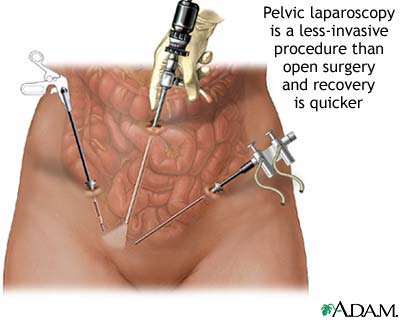Treatment
Increase your chance of becoming pregnant each month by having sexual intercourse at least every 3 days in the weeks leading up to and through the expected time of ovulation. Ovulation occurs about 2 weeks before the next period starts. So, if you get your period every 28 days, you should have sexual intercourse at least every 3 days between the 7th and 18th day after you get your period.
Treatment depends on the cause of infertility. It may involve:
- Education and counseling
- Medical procedures such as intrauterine insemination (IUI) and in vitro fertilization (IVF)
- Medicines to treat infections and clotting disorders, or promote ovulation
It is important to recognize and discuss the emotional impact that infertility has on you and your partner, and to seek medical advice from your health care provider.
Support Groups
Many organizations provide informal support and referrals for professional counseling. See infertility – support group.
Prognosis (Expectations)
A cause can be determined for about 80 – 85% of infertile couples.
Getting the right therapy (not including advanced techniques such as in vitro fertilization) allows pregnancy to occur in 50 – 60% of couples who were infertile.
Without any treatment, 15 – 20% of couples diagnosed as infertile will eventually become pregnant.
Complications
Although infertility itself does not cause physical illness, it can have a major emotional impact on the couples and individuals it affects.
Couples may have problems with their marriage. Individuals may experience depression and anxiety.
Calling Your Health Care Provider
Call for an appointment with your health care provider if you are unable to get pregnant.
Pictures & Images
Pelvic laparoscopy
-
Infertility: Overview, Causes
-
Infertility: Symptoms & Signs, Diagnosis & Tests
-
Infertility: Treatment
Review Date : 3/17/2009
Reviewed By : Linda Vorvick, MD, Family Physician, Seattle Site Coordinator, Lecturer, Pathophysiology, MEDEX Northwest Division of Physician Assistant Studies, University of Washington School of Medicine; Susan Storck, MD, FACOG, Chief, Eastside Department of Obstetrics and Gynecology, Group Health Cooperative of Puget Sound, Redmond, WA; Clinical Teaching Faculty, Department of Obstetrics and Gynecology, University of Washington School of Medicine. Also reviewed by David Zieve, MD, MHA, Medical Director, A.D.A.M., Inc.
